1. Projekttreffen des Erasmus+ Projektes „Heimat Europa – was uns verbindet, was uns trennt“
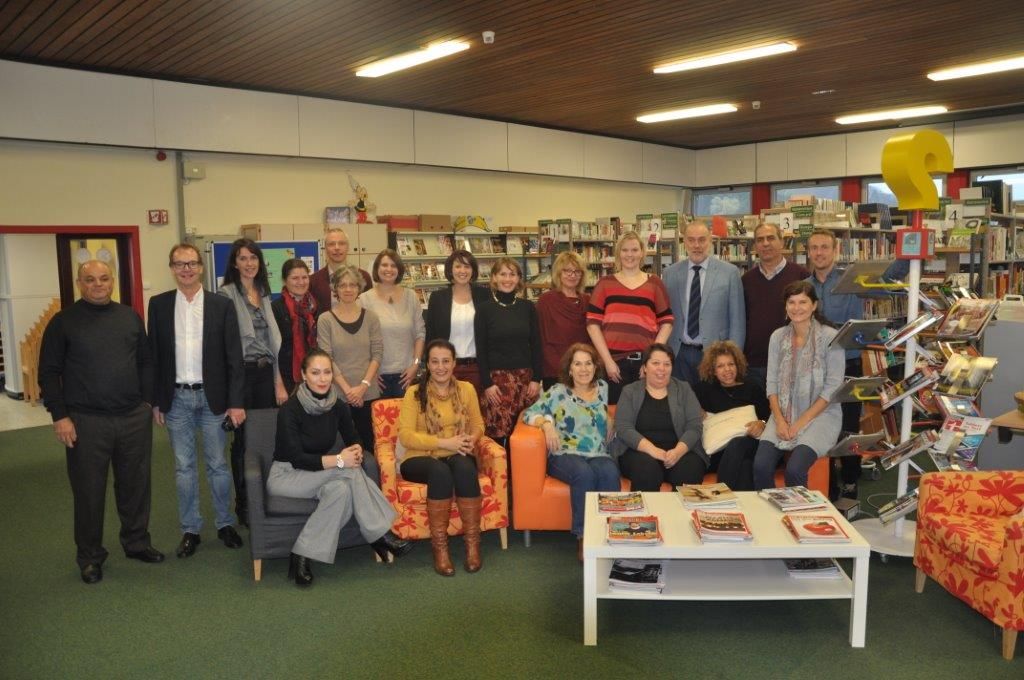
Englischer Projektbericht des 1. Treffens in Ettelbruck/Luxemburg.
Tagungsort: Lycée technique d‘Ettelbruck
Beginn: 16th November 2015
Ende: 19th November 2015

Teilnehmer:
- Rudolf-Rempel-Berufskolleg Bielefeld / Deutschland (Koordinator)
Heiner Flottmann, Maren Johannsen, Deborah Oyeniran, Andre Seewald - Lister vgs Campus Flekkefjord, Flekkefjord/ NO
Trond Tjorteland, Elizabeth Andersen, Nicole Thiele - YCEE TECHNIQUE D`ETTELBRUCK, Ettelbruck/Luxemburg
Sandra Linster, Nadine Rassel, Christiane Lippert, Danielle Fohl, Yves Monville, Edite Lopes - Karsiyaka Lisesi Izmir/Türkei
Yasemin Yardim Palamutlu, Süha Eroglu, Fikret Arikel, Sule Aktepe - ibc-: International Business College Hetzendorf Wien / Österreich
Eva Authried, Gabriele Holzweber, Elisabeth Kunauer
Top 1: Welcoming
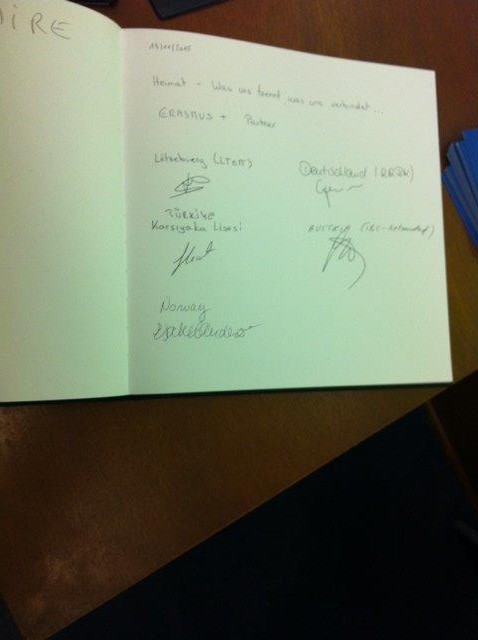 Mr. Klein (Principle of Lyceé Technique d´Ettelbruck) welcomes the participants
Mr. Klein (Principle of Lyceé Technique d´Ettelbruck) welcomes the participants- Andre Seewald gives an overview about the working day
Top 2: Presentation of the project schools
- Lyceé Technique d´Ettelbruck: 180 teachers, 1330 students, numbers rise, 100 classes, 29 nationalities, 24 languages at home, 54% are Luxemburgish, 32% Portuguese, rest small. Many of the Luxemburgish students speak their mother tongue at home, each course at school has a specific language (French, German, English or Luxemburgish) big problems for immigrants
- ibc-: hetzendorf Vienna: majority of immigrants comes from Serbia and Turkey, big mixture of other nationalities (50 different mother tongues, 27 different religious denominations and 64 different citizenships), 160 teachers, 10 mother tongue English teachers, many parents don´t speak German, some projects like collections of clothing and food, art projects for immigration, cultural events, free school books, free time activities, cultural tutor for all immigrants…
- Karsiyaka Lisesi Izmir: 950 students, 6 foreign students at the school, 62 teachers, many students from Syria in general, 152 different countries in general, school will take part in a programme for foreign students next time, try to adapt all foreign students to the school, integration is a big problem, they have a welcoming commitee for the foreign students to escort them, they have a commission which visits the families etc.
- Lister vgs Campus Flekkefjord: most immigrants come from Europe (most Polish) and Asia, reasons are family and work, now also to search asylum, from January until October the numbers rise from 500 till 8800 per month, estimates say that in 2016 Norway will have 120.000 refugees, refugees have right to get free language course and social subjects 300 up to 2700 hours if needed, learning Norwegian culture with the help of activities (sport skiing etc.) and school subjects, creating welcome culture in every behaviour of students, teachers and leaders
- RRB Bielefeld: 4623 students (3984 Germans, 143 Turkish, 496 others), 47 nations, unofficial 3323 German students and 1300 others depending on the last name of the students and not on the passports, one migration class, 16 students with different nationalities
Top 3: Key points of the project
- General information: result of application 87,5 of 100 points, duration September 2015 until August 2017, we have to write two reports – first one in September 2016 and the second one at the end of the project and we have to use the mobility tool which is not running yet
- Money is for project management and transnational project meetings but we can use also the money for the project management for the transnational meeting
- Participants who are not invited for the next meeting in Izmir are also allowed to send for example one teachers to the meeting. We just tried to keep the costs on a low level
- Aim of the project: new situation to handle the increasing number of migrants in our schools, some of us are immigration countries and some are emigration countries, we hope to get an overview about handling the problem and to make school live a little bit better, we like to find a common definition of “Heimat” and creating teaching units to improve a welcome structure, reduce disbalances, form an open mind and improve chances for the students on the job market
- How to reach the aims: November 2015 meeting in Ettlebruck, April 2016 meeting in Izmir, September 2016 Meeting in Bielefeld and creating a future workshop and creating a checklist for the welcome culture, meeting via eTwinning, Meeting in Vienna in March for a student conference
- Digital documentation: Gaby Holzweber takes care of the moodle platform, eTwinning will be created by the Luxemburgish participants (Sandra Linster), the participants from Vienna create a homepage, the reports of the meetings are written by Germany, Evaluation should be made by Romania or Czech Republic
Top 4: Management of “reception classes” at Lyceé Technique d´Ettelbruck
- Refugees at the age of 12 – 16 years come to the Lyceé, 14 students from different nationalities are in the refugee class, the majority comes from Portugal, the students help each other in the immigration class more than students in other classes besides they don´t know each other and use not the same mother tongue, students come already between the school year and join in the school live
- Presentation of Edite
- www.4motion.lu
- Teacher has many tasks in the refugee class e.g. help them finding friends, talk to the families, encourage them to work independently, give them opportunities to express their creativity, help to learn the new language etc.Most lessons in French (also History and culture are taught in this lessons), then Math, workshop working and Luxemburgish
- Different language levels have to be taught together in the reception class, the teacher has to decide which activities for which level he gives to the students
- 15 students is the limit for one class
- 5 computers in class, so students can use them for listening comprehensions etc.
- Theatre workshop to learn text in French
- Celebrating Birthday parties and sing Happy Birthday in French
- Suitcases project
- “Story line” information ... Elizabeth Andersen
Top 5: Management of integration in schools in Luxemburg
- Presentation of two refugees why and how they came to Luxemburg, one of the girls came at the age of 2 from Kosovo to Luxemburg. She feels home in both countries because of the left family down in the Kosovo
- Marco De Oliviera presents the nationalities in Luxemburg and the measures students have
- 7 people out of 10 have an immigration background
- Informs about the CASNA reception desk for newly arrived pupils
> Intercultural mediators provides translation services
> Teaching support and training
# Methods, books and pedagogical material for free
# Coordination of workshops - Publications for parents who arrive in different languages
- Pupils are integrated into regular classes and into special insertion classes
- The number of the language lessons depend on the skills of the students
- Pupils are devided into different class systems weather they speak French or not and later are integrated in the normal classes. (System in the brochure of CASNA)
- Discussion about the applicability to other countries: Question is it better to form one refugee class or to integrate refugees in the normal class?
> depends on the level the students are… without basic skills they can´t be integrated, we have the same gaps also in normal classes, it doesn´t depend on the nationality but for teachers it is really hard to work on all levels, it is a different if the pupils speak not the national language or they are just bad in a second language, students can´t help each other when the gap is to wide open, foreign language are taught in another way than a second language, students need the basics and after the basics you can integrate them in the regular classes, Austria is not allowed to build up an immigration class, what is correct in small schools when everybody sees the newcomers as a separated class? Students should just stay one year in a refugee class and later in a normal class. Students who come as a refugee have the same problems and can help each other in a better way in one class than in regular classes. It is a political discussion and we discuss about students at the age of 16 and not for a programme at a primary school.
Top 6: Planning of the work to be done prior to the meeting in Izmir April 2016
- The questionnaire from Vienna should be created via eTwinning, Nicole Thiele collects the ideas to overwork it until the 15. December and will overwork it until the 15. January. After that every school has to ask 60 students and evaluate it on its own. After evaluation every schools has to send it until the end of February to the Norwegian school
- Make a creative presentation with students that shows what “Heimat” means to them
- Start a catalogue with methods to teach units for integration in class with the help of a structure (Sandra Linster)
- Create and test two teaching units with methods and present the results in Izmir aim: What can we do to make school a place of “Heimat”
- Short power point presentation of the historical development of refugees in your country for Izmir and the prejudices of your country which has to do with migration
- Czech and Romania should make a presentation to answer the question how they deal with migrants at their schools.
Top 7: Date for Izmir
- Monday 11. April 2016– Thursday 14. April 2016
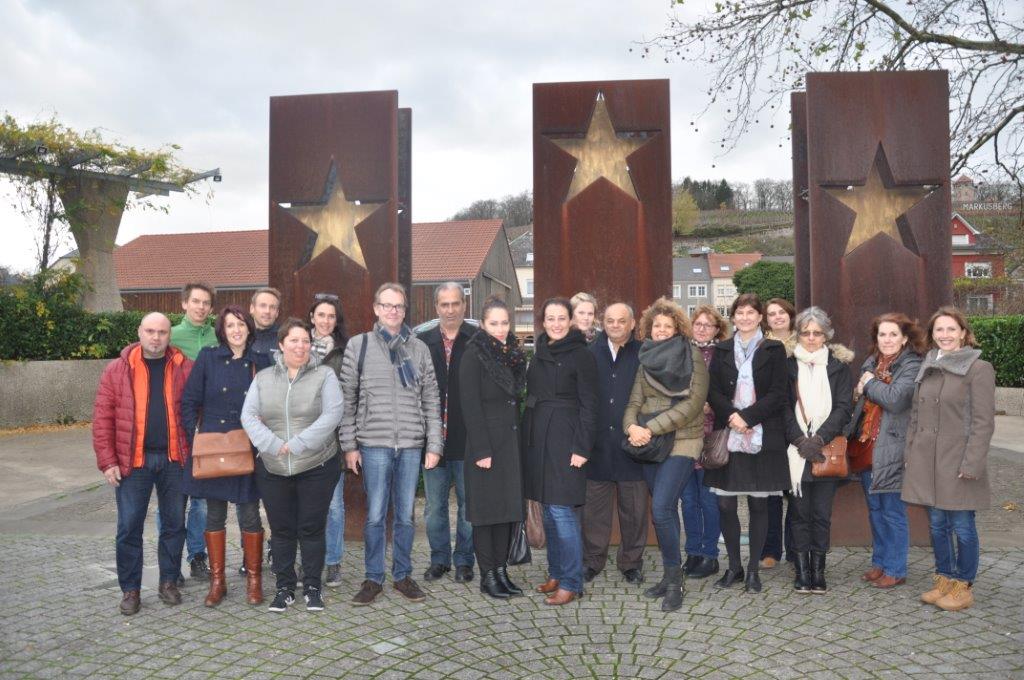
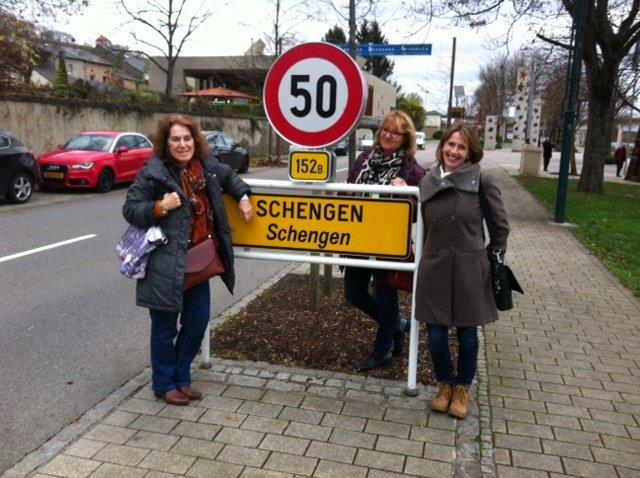
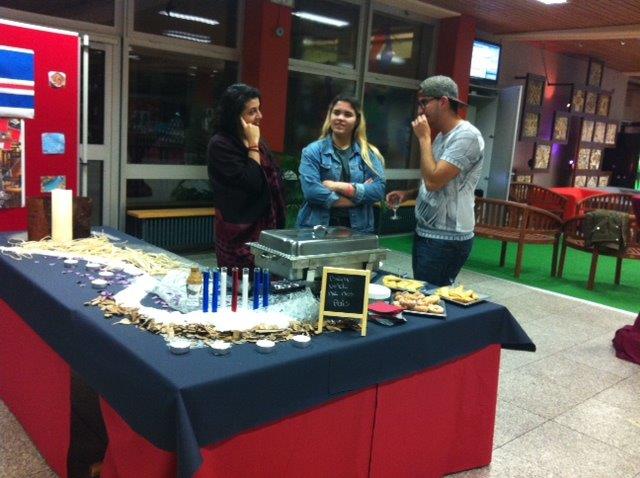
| Erasmus+ Projektseite „Heimat Europa“ | |
| Bericht des 1. Projekttreffens in Ettelbruck/Luxemburg | |
| Bericht des 2. Projekttreffens in Izmir | |
| Bericht des 3. Projekttreffen in Bielefeld |
 Wir haben den Staatspreis!
Wir haben den Staatspreis! Frieden für die Ukraine
Frieden für die Ukraine













